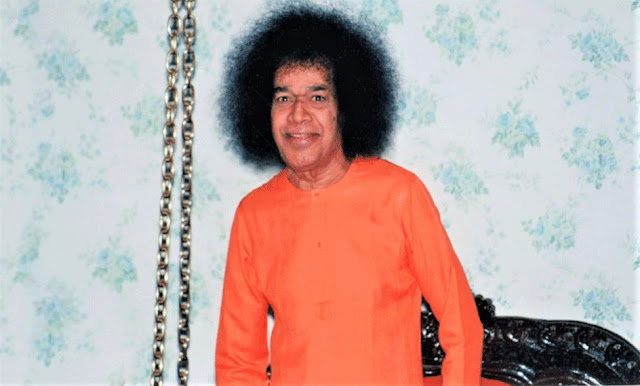Being a student in Swami’s institution is indeed a wholesome experience. Apart from being an ideal place for the pursuit of studies, it offers a unique physical proximity with Swami.
To us students, Swami is a mother, father, teacher, friend and confidante. One thing that strikes anyone who is in Prasanthi Nilayam, is the healing power of Swami’s love that is all encompassing and does not distinguish between big and small.
This healing power of Swami’s love is seen in a beautiful incident which occurred in the life of a fellow Sai brother. He was given to the vices of the world. When this boy came to see Swami, Swami blessed him with a personal interview. In the interview room, Swami asked him, “Do you believe in Me?” The boy was shocked. How did Swami know that he was an atheist? Even his parents did not know! Swami went on to say, “I know everything. I know that on this date (Swami told him the exact date) you used your pocket money to see a movie instead of going to school.” Swami mentioned to him the name of the theater, name of the movie and the name of the friend with whom he had gone. He even told the boy the exact amount of money he used on Samosas (snacks). The boy was shocked, bewildered and thoroughly convinced and the transformation was instantaneous.
Swami is indeed our mother and father. Swami’s love is that of a thousand mothers. When we are unable to comprehend the love of one mother, how can we comprehend that of a thousand? Once, Swami threw biscuit packets from the Mandir balcony to boys even though He was suffering from excruciating pain due to a hip injury. This shows the immense love of mother Sai towards Her children.
Another incident showing Swami’s love and care for children occurred in the life of an 8th class boy. One day, the boy suddenly developed high fever and had to be taken home. At home, he had a bath. He immediately developed cough and soon was very sick. The doctor was summoned immediately and it was diagnosed as Pneumonia. The boy was immediately rushed to the intensive care unit in a nursing home. Yet there was no sign of improvement. His mother was very much concerned and she broke down in front of her prayer altar. Lo and behold! On the altar appeared a globule of Vibhuti. This was given to the boy and he recovered immediately. The ‘serious Pneumonia case’ walked out of the hospital four days later! According to the doctors, it was one of the fastest recovery cases in that nursing home.
Swami’s visits to the student’s hostel are always memorable. The scene resembles that of a mother amongst her children. On one occasion, in Brindavan, Swami agreed to dine with the boys. However that day a boy fell sick and could not take part in the function. Swami arrived at about 7:30 p.m. He sat down and looked around and asked the Warden “Is everyone present?” “Yes Swami”, replied the Warden. Swami looked around again. “Where is ... he?” He asked referring to the sick boy. The surprised Warden replied that he was sick. Swami had the boy brought over and seated comfortably and that night, all dined together - a happy family.
Swami looks after us in every way. He is very keen on our academic progress. Many a times, He gives us advice on how to study and prepare for the examinations. Swami is a strong supporter of the adage: “Health is Wealth.” “Only in a healthy body can you house a healthy mind”, He says. Swami has introduced compulsory games so that we may develop the noble qualities of unity, determination and courage.
Swami stresses on all round development and if we have any untapped skill, it is brought out to its fullest. A prime example of Swami’s encouragement of skills is the idea of having students speak in His presence in front of large audience.
Swami says, “Manav Seva is Madhav Seva” and He sees to it that we follow the same. It is the students who maintain the hostel. In times of need, it is the boys who roll chapatis and bake them as well. Sometimes we have social work, wherein we clean the institute, school and hostel buildings. Indeed, here we learn the dignity of labour.
But apart from all this, the most important thing Swami teaches us is spirituality. During our stay in the hostel, we meet people from all over India and abroad. Boys in the hostel have to share rooms with 12 to 15 boys per room and must learn to adjust. This adjustment is the greatest Sadhana.
Swami, in His various discourses, teaches us how to become true men. “Only one who controls the mind is human. He is wise who knows and follows the intellect. An ideal person is one who harmonizes thought, word and deed.”
Once a group of scientists met Bhagavan and asked Him, “Who are You?” Swami made a revealing statement:
“I am a man amongst men,
I am a woman amongst women,
I am a child amongst children
… and when alone I am God.”
I end this article with a humble prayer:
“Beloved Bhagavan, Please grant us the power to recognize Your love and grace, so that we may tap the limitless potential within and become worthy instruments in Your Divine Mission.”
- Rakhal Gaitonde
Alumnus, Sri Sathya Sai Institute of Higher Learning
Prasanthi Nilayam



















